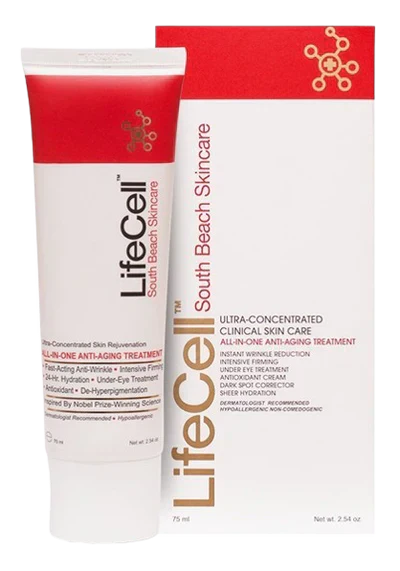The Irish poet Oscar Wilde is notorious for saying, “With age comes wisdom.” Aging can also bring with it shifting perspectives, new experiences, and a renewed appreciation for life. Although there are many things to enjoy about getting older, one thing many people struggle with is the changes in their skin.
If you find it difficult to adjust to the fine lines and wrinkles you see in the mirror, you’re not alone. Aging is a privilege and can be a beautiful process. However, there’s nothing wrong with wanting to take care of your aging skin. One of the best ways to reduce the appearance of fine lines, wrinkles, and age spots is to moisturize regularly.
Many brands claim to have the optimal formula, and it can be hard to sift through all the noise. Let’s define exactly what mature skin is and how to best support it, and discuss some of the best anti-aging moisturizers according to the research.
What is Mature Skin?
Dermatologists consider skin to be mature when it shows signs of aging, including fine lines, wrinkles, dehydration, and sun spots from ultraviolet radiation (UV) damage. These issues are caused by age-related changes including slower cell turnover, reduced collagen synthesis, and depleted levels of hyaluronic acid (HA) leading to moisture loss.[1]
Skin is generally considered to be mature around the age of 40. However, the complexion may begin showing signs of age as early as 25, especially if you don’t follow a regular skincare routine. Certain lifestyle factors can speed up skin aging, including poor diet, smoking, excess alcohol consumption, sun exposure without protection, and environmental pollution.
Characteristics of Mature Skin
Some of the primary signs of mature skin include dryness, thinness, paleness, dullness, dark spots, loss of volume, large pores, fine lines, and wrinkles. As we said previously, these signs develop due to biological and biochemical processes happening at a microscopic level, such as a reduction in collagen and moisture levels. Your collagen production decreases by 1% each year starting in your mid to late twenties. Following menopause, your skin may experience a 30% decline in collagen.[2]
In addition to depleting collagen levels, other physiological changes occur as your skin ages. Cell proliferation in the basal cell layer of your skin decreases,[3] for example, which thins out your skin. Similar to collagen, your skin’s hyaluronic acid levels begin to decline around your mid-twenties and this can dramatically impact skin hydration.[4] The lower moisture levels can lead to dryness, wrinkles, fine lines, and loss of plumpness.
The Importance of Moisturizing for Mature Skin
As you age your skin loses moisture, so it requires extra hydration and nourishment. Properly moisturizing your skin can reduce transepidermal water loss, improve barrier function, and restore the integrity of the stratum corneum.[5] The stratum corneum is the outer layer of your epidermis which protects the skin from environmental stressors. Moisturizing properly is the key to keeping your skin looking healthy, glowy, elastic, and plump, and it begins with a good skincare routine.
Skincare for Mature Skin
It’s important to make sure that you tailor your skincare routine for mature skin to your specific needs, which may include balancing moisture content, reducing the appearance of fine lines and wrinkles, incorporating antioxidant support, reducing hyperpigmentation, or all of the above.
A good skincare routine begins with a cleanser. When it comes to mature skin, choosing a cleansing formula that effectively removes dirt, oil, and debris but isn’t overly stripping is essential. After cleansing, apply toner and anti-aging serum or cream with ingredients that support dry, mature skin, such as retinol, vitamin C, squalene, glycerin, apricot kernel oil, peptides, and hyaluronic acid. Follow up by using a hydrating moisturizer with a comprehensive formula that includes one or more active ingredients.
It’s imperative to finish off your daytime skincare routine by applying sunscreen to minimize damage from UV rays.[6] Protecting the skin from the sun can prevent further signs of aging, such as photodamage, wrinkling, and loss of elasticity.
Beneficial Skincare Ingredients for Mature Skin
Let’s look at the benefits of some of the most potent active skincare ingredients for mature skin.
-
Vitamin C: This powerful antioxidant can help maintain skin moisture, increase collagen production, and decrease signs of photoaging like hyperpigmentation.[7] Because it’s an antioxidant, vitamin C destroys the free radicals that can break down collagen and cause premature aging.
-
Squalene: Squalene is part of the oil naturally produced by your skin, and it’s deeply hydrating but not pore-clogging. Due to its anti-inflammatory properties, it can also reduce the redness and irritation that often accompanies dry skin.[8]
-
Glycerin: This skincare ingredient is a humectant, meaning it helps the skin draw and retain moisture. A 2016 study[9] deemed glycerin the most effective humectant for increasing hydration compared to other common ingredients like alpha hydroxy acids (AHAs), propylene glycol, and panthenol.
-
Apricot Kernel Oil: Apricot kernel oil is revitalizing and hydrating, and ideal for aging skin because it’s high in the antioxidant vitamin E. Research shows its phytochemical components can fight inflammation and free radicals while promoting skin barrier homeostasis.[10]
-
Hyaluronic Acid: Incorporating hyaluronic acid into your skincare routine can reduce the appearance of fine lines and wrinkles, as it deeply hydrates and plumps the complexion. In addition to reducing signs of age, it improves skin elasticity.[11]
Discover the Top Moisturizers for Mature Skin
Based on the existing research, we’ve compiled a list of some of the best moisturizers for mature skin. These products are science-backed and attract high customer ratings.
Blackstone Collection 24-Hour Moisturizer Cream: This moisturizer is made specifically for men with mature skin, and it offers potent, around-the-clock hydration. The comprehensive formula deeply moisturizes, makes the skin smooth and supple, combats free radicals, protects against premature aging, and promotes a youthful appearance.
This cream offers several ingredients that are beneficial for mature skin, including hyaluronic acid, squalene, and apricot kernel oil. You really are getting the most bang for your buck with the Blackstone Collection 24-Hour Moisturizer Cream. It has over 160 five-star reviews, and several customers have reported achieving a more youthful and hydrated complexion with only 4 weeks of use. We’re confident that you’ll love this formula as much as we do.
Infusoderm Deep Hydration Daily Moisturizer: If you want to hydrate, revitalize, and brighten your complexion, the Infusoderm Deep Hydration Daily Moisturizer is our top pick. It’s one of the best moisturizers for mature skin, with a formula that is light and refreshing but still provides deep hydration. This cream includes antioxidant-rich botanicals like cloudberry and snow algae.
The formula also has ingredients that boost skin hydration, strengthen the moisture barrier, fight free radical damage, energize dull skin, and promote a healthy complexion. In a user satisfaction survey, 89% of women reported a significant reduction in dullness and dryness after only four weeks of use.
Dermaxsol Hydrating SPF Daily Moisturizer: The Dermaxsol Hydrating SPF Daily Moisturizer provides all-day hydration, leaving your skin feeling soft, silky, and smooth. In addition, it contains broad-spectrum sunscreen to protect your skin from harmful UV rays and prevent further signs of aging.
Many customers have reported that the formula sinks into their skin rapidly without leaving a greasy residue. Aside from its ultra-hydrating and sun-protective ingredients, the Dermaxsol Hydrating SPF Daily Moisturizer contains beeswax, which is high in vitamin A and helps repair damaged skin cells.
Day vs. Night Moisturizer: What’s the Difference?
You can sneak in as many beneficial ingredients as possible for dry, mature skin by diversifying your day and night moisturizers. Your daytime moisturizer should ideally contain antioxidants to protect against free radicals and the environmental pollutants you encounter throughout the day. It should also include at least SPF30 to protect your skin from UV rays and photoaging.
Day creams are often lighter than night formulas, so you can seamlessly apply your makeup on top. Key ingredients to look for in quality daytime moisturizers include hyaluronic acid, SPF, vitamin C, and glycerin.
Night creams are often thicker and don’t contain SPF, as you don’t need it. Compared to day creams, they’re even more hydrating and rejuvenating. They deliver lasting moisture that goes to work hydrating your skin while you sleep.
Night creams might contain potent ingredients that aren’t included in day creams because they increase your sensitivity to the sun. High-level ingredients to look for in nighttime moisturizers include retinol, squalene, jojoba oil, peptides, and AHAs.
Frequently Asked Questions
These are our answers to some of the most commonly asked questions about skincare for mature skin.
Does Mature Skin Need Moisturizer?
Mature skin requires extra moisturizer compared to younger complexions because hyaluronic acid and collagen levels decline as you age. Replacing the lost hydration reduces dryness, plumps your skin, and smooths fine lines and wrinkles.
As your skin matures it also thins, and the skin barrier becomes weaker. Keeping dry, mature skin moisturized can help restore barrier function and protect it from environmental stressors that contribute to signs of aging, like sun radiation, toxic pollutants, allergens, free radicals, and harsh weather conditions.
At What Age Does Your Face Look Mature?
Your skin can start showing signs of age as early as your mid-twenties, however, medical professionals generally consider skin “mature” at around age 40. Some of the potential characteristics of mature skin include dryness, fine lines, wrinkles, dullness, large pores, and hyperpigmentation.
Factors like poor diet, stress, environmental pollutants, smoking, excess alcohol consumption, and unprotected sun exposure can lead to premature skin aging.
How Can I Moisturize My Skin After 50?
After age 50, it’s important to choose skincare products with ultra-hydrating ingredients like humectants and emollients. Humectants are ingredients that attract and retain massive amounts of moisture, such as glycerin, hyaluronic acid, honey, propylene glycol, beeswax, panthenol, and alpha hydroxy acids (AHAs).
Emollients seal in moisture and create a protective barrier between the outer layer of the skin and the environment. Common emollients like lanolin, petrolatum, beeswax, squalene, and shea butter protect and lubricate the skin
Does Moisturizer Reduce Dark Skin?
Moisturizers won’t reduce dark spots or hyperpigmentation unless they specifically contain ingredients that lighten the skin, like Vitamin C, AHAs, niacinamide, and retinol.
Does Moisturizer Make Skin Glow?
Yes, if you want to achieve a glowing complexion, you have to moisturize your skin daily. When properly hydrated your skin reflects light, giving it a radiant appearance. In addition, the best moisturizers for mature skin leave you looking soft, smooth, and supple.
Conclusion
All skin types, young or mature, are beautiful. Taking care of your skin according to your current life stage is an act of love and self-care. If you want to care for dry, mature skin, start with the essentials by using a moisturizer with ingredients like squalene, glycerin, hyaluronic acid, and antioxidants. For even more potent anti-aging benefits, look for products with retinol and AHAs, and the essential SPF for daytime.
Our top moisturizer picks for mature skin are a great place to start, and include Blackstone Collection 24-Hour Moisturizing Cream, Infusoderm Deep Hydration Daily Moisturizer, and Dermaxsol Hydrating SPF Daily Moisturizer. You may want to consult with your dermatologist for further guidance on building a skincare routine for a mature complexion.
References
1] ↑https://www.ncbi.nlm.nih.gov/pmc/articles/PMC3583886/
2] ↑https://www.uclahealth.org/news/should-you-take-collagen-supplements
3] ↑https://www.ncbi.nlm.nih.gov/pmc/articles/PMC6047276/
4] ↑https://www.jaad.org/article/S0190-9622%2816%2900202-4/fulltext
5] ↑https://pubmed.ncbi.nlm.nih.gov/22913439/
6] ↑https://www.ncbi.nlm.nih.gov/pmc/articles/PMC6773941/
7] ↑https://www.ncbi.nlm.nih.gov/pmc/articles/PMC3673383/
8] ↑https://health.clevelandclinic.org/squalane/
9] ↑https://www.ncbi.nlm.nih.gov/pmc/articles/PMC4885180/
10] ↑https://www.ncbi.nlm.nih.gov/pmc/articles/PMC9332734/
11] ↑https://www.ncbi.nlm.nih.gov/pmc/articles/PMC10078143/
Mentioned in this article
More stories
Solvaderm Contest Winners








